Aaugh! A Brief List of Official Russia Claims that Proved to be Bogus
The Director of National Intelligence releases a report, and the press rushes to kick the football again.
The Office of the Director of National Intelligence (ODNI) has released a much-hyped, much-cited new report on “Foreign Threats to the 2020 Elections.” The key conclusion:
We assess that Russian President Putin authorized, and a range of Russian government organizations conducted, influence operations aimed at denigrating President Biden’s candidacy and the Democratic Party, supporting former President Trump, [and] undermining public confidence in the electoral process…
The report added Ukrainian legislator Andrey Derkach, described as having “ties” to “Russia’s intelligence services,” and Konstantin Kilimnik, a “Russian influence agent” (whatever that means), used “prominent U.S. persons” and “media conduits” to “launder their narratives” to American audiences. The “narratives” included “misleading or unsubstantiated allegations against President Biden” (note they didn’t use the word “false”). They added a small caveat at the end: “Judgments are not intended to imply that we have proof that shows something to be a fact.”
As Glenn Greenwald already pointed out, the “launder their narratives” passage was wolfed down by our intelligence services’ own “media conduits” here at home, and regurgitated as proof that the “Hunter Biden laptop story came from the Kremlin,” even though the report didn’t mention the laptop story at all. Exactly one prominent reporter, Chris Hayes, had the decency to admit this after advancing the claim initially.
With regard to the broader assessment: how many times are we going to do this? We’ve spent the last five years watching as anonymous officials make major Russia-related claims, only to have those evidence-free claims fizzle.
From the much-ballyhooed “changed RNC platform” story (Robert Mueller found no evidence the changed Republican platform was “undertaken at the behest of candidate Trump or Russia”), to the notion that Julian Assange was engaged in a conspiracy with the Russians (Mueller found no evidence for this either), to Michael Cohen’s alleged secret meetings in Prague with Russian conspirators (“not true,” the FBI flatly concluded) to the story that Trump directed Cohen to lie to Congress (“not accurate,” said Mueller), to wild stories about Paul Manafort meeting Assange in the Ecuadorian embassy, to a “bombshell” tale about Trump foreknowledge of Wikileaks releases that blew up in CNN’s face in spectacular fashion, reporters for years chased unsubstantiated claims instead of waiting to see what they were based upon.
The latest report’s chief conclusions are assessments about Derkach and Kilimnik, information that the whole world knew before this report was released. Hell, even Rudy Giuliani, whose meeting with Derkach is supposedly the big scandal here, admitted there was a “50/50 chance” the guy was a Russian spy. Kilimnik meanwhile has now been characterized as having “ties” to Russian intelligence (Mueller), and as a “Russian intelligence officer” (Senate Intelligence Committee), and is now back to being a mere “influence agent.” If he is Russian intelligence, then John McCain’s International Republican Institute (where Kilimnik worked), as well as embassies in Kiev and Moscow (where Kilimnik regularly gave information, according to the New York Times), have a lot of explaining to do.
No matter what, the clear aim of this report is to cast certain stories about Joe or Hunter Biden as misinformation, when the evidence more likely shows that material like the Hunter Biden emails is real, just delivered from a disreputable source. That makes such stories just like, say, the Joe Biden-Petro Poroshenko tapes, which were also pushed by Derkach and reported on uncontroversially by major media outlets like the Washington Post, before it became fashionable to denounce those reporting such leaks as Russian “proxies” and “conduits.”
I never thought the Hunter Biden laptop story was anywhere near as big of a deal as the efforts by platforms like Facebook and Twitter to block access to it, which seemed a historic and dangerous precedent. This new effort to cast the reporting of “allegations against President Biden” as participation in a foreign intelligence campaign is nearly as ominous. Even worse is the degree to which press figures are devouring the message. Will any bother to point out the huge quantity of recent official takes on the Russia story that went pear-shaped? A very, very brief sample:
1. All 17 U.S. intelligence agencies backed an assessment that cyberattacks in 2016 came from the “highest levels of the Kremlin.” That was later corrected in congressional testimony to four (it was actually three):
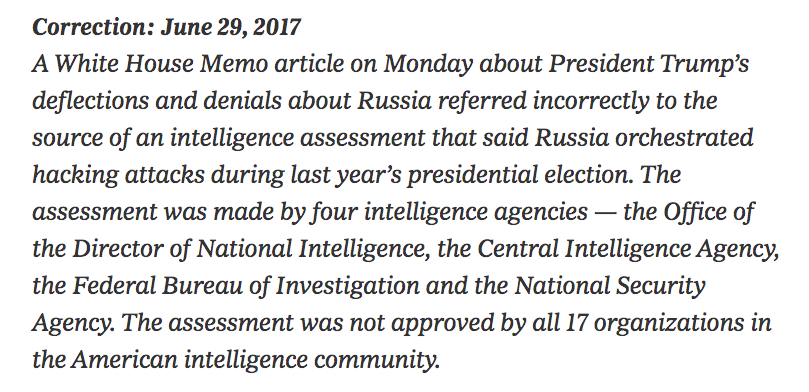
2. The Trump organization was communicating with Russia via a mysterious server tied to Russia’s Alfa Bank. Justice Department Inspector General Michael Horowitz noted the FBI concluded “by early February 2017 that there were no such links,” yet stories pegged to anonymous intel officials persisted for years after that.
3. Russia “hacked a Vermont utility,” according to U.S. officials! Except, the next day:

4. Four “current and former American officials,” citing a “trove of information the FBI is sifting through,” said the Trump campaign had “repeated contacts with senior Russian intelligence officials.” Months later:
5. A “senior U.S. government official” characterized the ex-spy who claimed Russia had been cultivating Donald Trump for at least five years, and could “blackmail him,” was “a credible source with a proven record of providing reliable, sensitive, and important information to the US government.” But Christopher Steele was subsequently dismissed as an FBI source for his “completely untrustworthy” decision to talk to the media, and Horowitz not only discovered that both the FBI and the CIA (who dismissed his reports as “internet rumor”) had many reservations about his credibility, but that his famed “blackmail” claims about pee and prostitutes had been made in “jest,” over “beers.”
6. Former Trump adviser Carter Page was a “catalyst” for the FBI investigation into connections between Donald Trump and Russia, according to “current and former law enforcement and counterintelligence officials.” Similarly, the New York Times cited court documents in describing George Papadopoulos: “Trump Campaign Adviser Met With Russian to Discuss ‘Dirt’ on Clinton.”
But Deputy FBI Director Andrew McCabe testified that as early as August of 2016, Page became the focus of secret surveillance because Papadopoulos had been deemed a dead end. This scarcely reported detail only rendered the entire predicate for the FBI’s Trump-Russia investigation absurd:
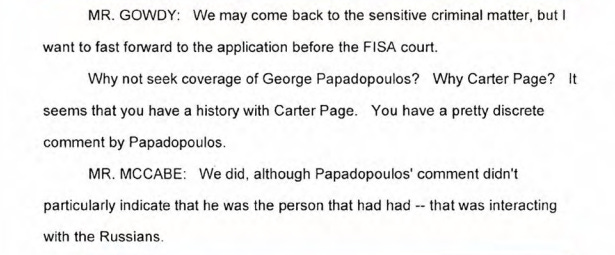 7. Jeff Sessions did not disclose contacts with a Russian ambassador in a security clearance form, Justice Department sources told multiple outlets, in what became a major, front-page scandal. Except it came out later he didn’t have to make those disclosures, and as for the contacts themselves? “Brief, public, and non-substantive,” said Robert Mueller.
7. Jeff Sessions did not disclose contacts with a Russian ambassador in a security clearance form, Justice Department sources told multiple outlets, in what became a major, front-page scandal. Except it came out later he didn’t have to make those disclosures, and as for the contacts themselves? “Brief, public, and non-substantive,” said Robert Mueller.
8. “Senior FBI and national intelligence officials” told the White House and major news outlets that releasing the name of an “informant” in the Trump-Russia investigation could “risk lives,” one of many such stories (we heard similar warnings before the release of the name of Christopher Steele, his source Igor Danchenko, the “exfiltrated spy” Oleg Smolenkov, the “anonymous” New York Times editorialist, the Ukraine “whistleblower,” and others). The “informant” Haspel warned about, Stefan Halper, turned out to have been a professor outed by name as an intelligence source in the New York Times all the way back in 1983:
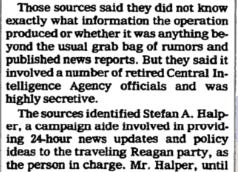
9. “Current and former intelligence officers” told the New York Times that CIA director Gina Haspel showed Donald Trump pictures of British children sickened, as well as ducks killed, by a Russian assassination in England using the deadly nerve agent Novichok. It turns out there were no such sick children or dead ducks, and Haspel didn’t show such pictures, an error the Times chalked up to lack of research time:
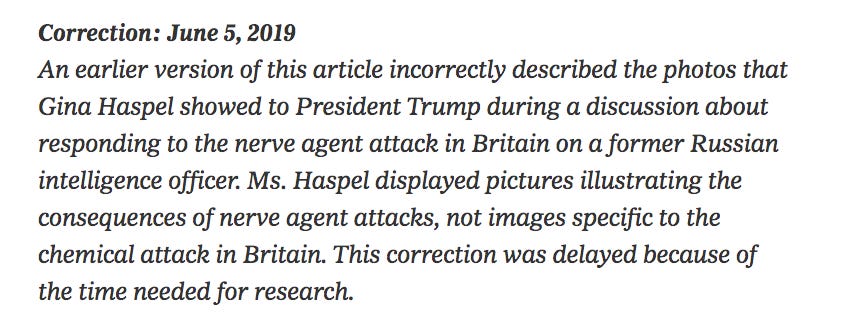
10. According to “officials briefed on the matter,” New York Times reported, and the Washington Post “confirmed,” that “a Russian military spy unit offered bounties to Taliban-linked militants to attack coalition forces in Afghanistan.” Two months later, an on-the-record military official was less certain:
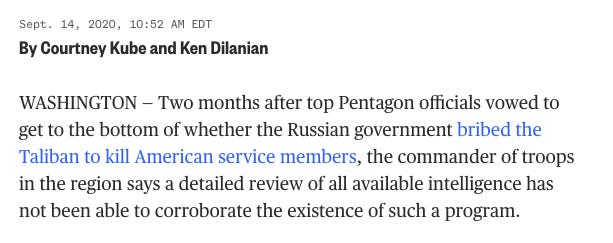
One could go on and on with this list, from the bogus claims about Maria Butina that ended up as Times headlines (“Suspected Secret Agent Used Sex in Covert Plan”), to overhype of the Cambridge Analytica story (which turned out to have nothing to do with Brexit), to the bass-ackwards denunciations of the so-called “Nunes memo” (validated almost entirely by Horowitz), and on, and on.
Does this mean the Russians don’t meddle? Of course not. But we have to learn to separate real stories about foreign intelligence operations with posturing used to target domestic actors while suppressing criticism of domestic politicians. It’s only happened about a hundred times in the last five years — maybe it’s time to start asking for proof in these episodes?

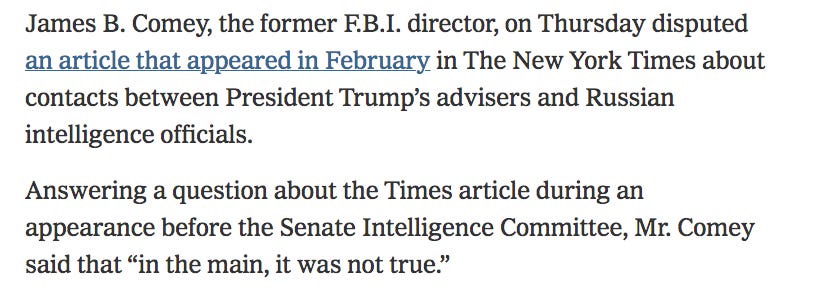
No comments:
Post a Comment
Leave your thoughts & comments